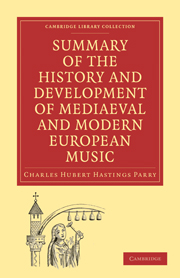Book contents
- Frontmatter
- PREFACE
- Contents
- CHAPTER I THE MUSIC OF THE MIDDLE AGES
- CHAPTER II MUSIC IN ENGLAND FROM THE BEGINNING OF TUDOR TIMES TILL THE RESTORATION OF THE STUARTS
- CHAPTER III THE BEGINNINGS OF OPERA AND ORATORIO
- CHAPTER IV THE PROGRESS OF OPERA IN VARIOUS COUNTRIES, FROM THE MIDDLE OF THE SEVENTEENTH CENTURY TILL THE TIME OF GLUCK
- CHAPTER V ORATORIO IN THE TIME OF BACH AND HANDEL
- CHAPTER VI THE PROGRESS OF INSTRUMENTAL MUSIC UP TO THE TIME OF J. S. BACH
- CHAPTER VII THE PROGRESS OF INSTRUMENTAL MUSIC IN THE EIGHTEENTH CENTURY
- CHAPTER VIII OPERA IN GLUCK AND MOZART'S TIME, AND IMMEDIATELY AFTER
- CHAPTER IX THE PROGRESS OF INSTRUMENTAL MUSIC TO BEETHOVEN AND HIS IMMEDIATE SUCCESSORS
- CHAPTER X MODERN INSTRUMENTAL MUSIC
- CHAPTER XI MODERN OPERA
- CHAPTER XII MODERN VOCAL MUSIC
CHAPTER VIII - OPERA IN GLUCK AND MOZART'S TIME, AND IMMEDIATELY AFTER
Published online by Cambridge University Press: 29 August 2010
- Frontmatter
- PREFACE
- Contents
- CHAPTER I THE MUSIC OF THE MIDDLE AGES
- CHAPTER II MUSIC IN ENGLAND FROM THE BEGINNING OF TUDOR TIMES TILL THE RESTORATION OF THE STUARTS
- CHAPTER III THE BEGINNINGS OF OPERA AND ORATORIO
- CHAPTER IV THE PROGRESS OF OPERA IN VARIOUS COUNTRIES, FROM THE MIDDLE OF THE SEVENTEENTH CENTURY TILL THE TIME OF GLUCK
- CHAPTER V ORATORIO IN THE TIME OF BACH AND HANDEL
- CHAPTER VI THE PROGRESS OF INSTRUMENTAL MUSIC UP TO THE TIME OF J. S. BACH
- CHAPTER VII THE PROGRESS OF INSTRUMENTAL MUSIC IN THE EIGHTEENTH CENTURY
- CHAPTER VIII OPERA IN GLUCK AND MOZART'S TIME, AND IMMEDIATELY AFTER
- CHAPTER IX THE PROGRESS OF INSTRUMENTAL MUSIC TO BEETHOVEN AND HIS IMMEDIATE SUCCESSORS
- CHAPTER X MODERN INSTRUMENTAL MUSIC
- CHAPTER XI MODERN OPERA
- CHAPTER XII MODERN VOCAL MUSIC
Summary
About the middle of the eighteenth century the indolence of fashionable audiences and the short-sighted egotism of popular singers had reduced the opera to such a state of monotonous and mechanical dulness that a reaction was inevitable. Slight changes and improvements were frequently attempted by various composers, but the name with which the most definite attempts at general reform are always associated is that of C. Willibald von Gluck.
This notable composer was born at Neumarkt in Germany in 1714, and was early subjected to Italian influences; as he first went to Vienna (where Italian taste was predominant) in 1736, and then completed his musical studies in Milan, where he brought out his first Italian opera, “Artaserse,” in 1741. Meeting with success in this work he followed it up with several more of the usual Italian pattern, such as “Demofoon,” “Artamene,” “Poro,” “Alessandro nell’ Indie.” He was invited to England in 1745, just at the time that Handel was in the full swing of his Oratorio career. Gluck did not make a great mark in England, but he had the advantage of hearing Handel's solid choral works, and the impression made on him was doubtless one of the causes which led him to break away from the vapid traditions of the old opera seria. A still more powerful cause was the impression made on him by Rameau's operas, which he heard in Paris on his way back to Vienna from London.
- Type
- Chapter
- Information
- Publisher: Cambridge University PressPrint publication year: 2009First published in: 1893



